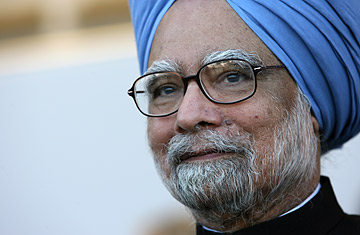
Indian Prime Minister Manmohan Singh
On Nov. 24, the Obamas will host their first state dinner, in honor of India's Prime Minister, Manmohan Singh. The elaborate formalities that U.S. Presidents have reserved for visiting heads of state have been retained since the 19th century, and the first dinner hosted by Michelle and Barack Obama is a highly anticipated event: some 400 guests are expected to attend. So who's getting all this attention? A beturbaned 77-year-old former economist, who in May was sworn in for his second term as leader of the world's second most populous country and its largest democracy. Singh's visit comes on the heels of Obama's first visit to Asia — a trip that did not include a stop in India. The leaders are expected to discuss climate change, the war in Afghanistan and both nations' relationship with Pakistan, India's rival and neighbor.
Fast Facts:
• Born in a village in undivided India's Punjab province on Sept. 26, 1932.
• Is a follower of Sikhism, a South Asian religion distinct from Islam or Hinduism. There are about 25 million Sikhs worldwide, most of them in India.
• Has three daughters with his wife of 51 years, Gursharan Kaur.
• Graduated from Punjab University in 1948 and went on to earn economics degrees at Cambridge and Oxford. Served on the faculty at Punjab and the Delhi School of Economics in the 1960s.
• Worked as an economics adviser to Indian Prime Ministers in the 1970s and later held a series of economic posts with the Indian government, including governor of the Reserve Bank of India from 1982 to 1985.
• Credited with reforming India during his five years as Finance Minister from 1991 to 1996, rescuing the country from the brink of economic collapse by lowering taxes, devaluing the rupee, privatizing state-run industries and instituting foreign investments.
• Took over as Prime Minister in 2004 after India's Congress Party, led by Sonia Gandhi — the Italian-born widow of former Prime Minister Rajiv Gandhi — took power in landslide elections. Singh is the first non-Hindu to hold the position.
• Has attended one other state dinner at the White House — in 2005, when he met with George W. Bush.
• As Prime Minister in 2005, brokered a landmark nuclear agreement with the U.S. that ended 34 years of isolation for India in nuclear commerce; international sanctions had previously cut the country off from foreign technology after it tested its first nuclear bomb in 1974; in India the deal brought criticism for fostering overly close ties to the U.S.
• Began his second term as Prime Minister in May 2009, after the Congress Party notched a second legislative win, calling the victory a "massive mandate" for Congress's platform of economic reform and championing the poor. He's the first Indian incumbent to be re-elected in 40 years.
Quotes By:
"Things changed. And the United States recovered from difficult economic situation ... it has shown remarkable capacity to bounce back."
— On the eve of his trip to Washington, on the economic situation in America (Times of India, Nov. 23, 2009)
"I have no apprehension that our relations with the United States would in any way suffer because of the change of headmistress."
— On his relationship with Obama, compared with his good relationship with President Bush, in an interview with CNN (CNN, Nov. 22, 2009)
"Clearly the worst is behind us."
— On the financial crisis' effect, at a World Economic Forum meeting (New York Times, Nov. 8, 2009)
"We look upon our relationship with the United States in the wider prospect. India is a country of great potential, and also in the same way we feel that our relationship with the United States does not have to be a hyphenated relationship between India and Pakistan."
— Answering a question on how U.S.-Pakistan relations affect India's relationship with the U.S. (Charlie Rose, Sept. 21, 2004)
Quotes About:
"He has been the cleanest Prime Minister. There are no scandals against him."
— M. Veerappa Moily, Congress Working Committee member, on Singh while he was running for re-election (Indo-Asian News Service, April 3, 2008)
"I really like Prime Minister Manmohan Singh. The Prime Minister is a wise leader."
— George W. Bush, former U.S. President, complimenting Singh the day after he called Bush a "great friend of India" (Press Trust of India, Oct. 31, 2009)
"Contrary to what people believe — that Manmohan Singh has been a weak Prime Minister — I would say he has shown himself as a strong [ruler]. How else could he have tackled George Bush on the Indo-U.S. nuclear deal?"
— M. Veerappa Moily, Congress Working Committee member, on Singh during India's national parliamentary elections (Indo-Asian News Service, April 3, 2008)
